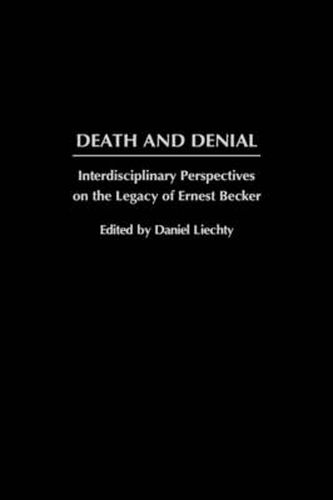Readings Newsletter
Become a Readings Member to make your shopping experience even easier.
Sign in or sign up for free!
You’re not far away from qualifying for FREE standard shipping within Australia
You’ve qualified for FREE standard shipping within Australia
The cart is loading…






In this edited collection of essays, professionals and academics from across the spectrum of the humanities and social sciences outline the ways in which Generative Death Anxiety theory impacts their field and discuss the work of its most famous proponent, Ernest Becker, whose ^IDenial of Death^R won the Pulitzer Prize in 1973. The essays demonstrate that recognition of this deeply rooted source of human behavior and attitudes provides a fertile organizing principle for the humanities and social sciences.
The theory of Generative Death Anxiety is based on the recognition that if there is any uniquely human characteristic, it is the ability to anticipate and prepare for death. This recognition of mortality, however, runs directly counter to our survival instincts and must be repressed, thus creating a constant supply of repressed psychic energy-which, shaped by cultural and narrative factors, emerges in a rich array of human creativity and resourcefulness, but also in racism, religious chauvinism, reactive violence, and other types of pathological behavior. In this edited collection of essays, professionals and academics from across the spectrum of the humanities and social sciences outline the ways in which this theory impacts their field and discuss the work of its most famous proponent, Ernest Becker, whose ^IDenial of Death^R won the Pulitzer Prize in 1973. The essays demonstrate that recognition of this deeply rooted source of human behavior and attitudes provides a fertile organizing principle for the humanities and social sciences.
$9.00 standard shipping within Australia
FREE standard shipping within Australia for orders over $100.00
Express & International shipping calculated at checkout
In this edited collection of essays, professionals and academics from across the spectrum of the humanities and social sciences outline the ways in which Generative Death Anxiety theory impacts their field and discuss the work of its most famous proponent, Ernest Becker, whose ^IDenial of Death^R won the Pulitzer Prize in 1973. The essays demonstrate that recognition of this deeply rooted source of human behavior and attitudes provides a fertile organizing principle for the humanities and social sciences.
The theory of Generative Death Anxiety is based on the recognition that if there is any uniquely human characteristic, it is the ability to anticipate and prepare for death. This recognition of mortality, however, runs directly counter to our survival instincts and must be repressed, thus creating a constant supply of repressed psychic energy-which, shaped by cultural and narrative factors, emerges in a rich array of human creativity and resourcefulness, but also in racism, religious chauvinism, reactive violence, and other types of pathological behavior. In this edited collection of essays, professionals and academics from across the spectrum of the humanities and social sciences outline the ways in which this theory impacts their field and discuss the work of its most famous proponent, Ernest Becker, whose ^IDenial of Death^R won the Pulitzer Prize in 1973. The essays demonstrate that recognition of this deeply rooted source of human behavior and attitudes provides a fertile organizing principle for the humanities and social sciences.